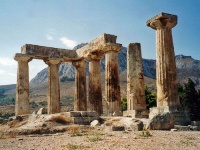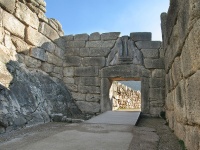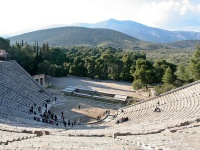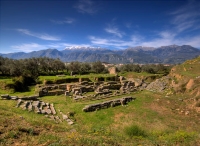Peloponnese Peninsula Travel Guide
The southern part of mainland Greece consists of the large Peloponnese Peninsula, which is divided from the mainland by the Corinth Canal. The region was the ancient stomping ground of mythological heroes such as Hercules, Sisyphus, Callisto, Electra and Perseus and, today, hosts virtually every history buff visiting the country. Indeed, most of Greece's important ancient sites are in the region. These include the the ancient ruins at Sparta, Monemvasia, Corinth, Mycenae and Epidaurus.
This captivating destination also features stunning landscapes that range from rugged mountains and rolling hills to serene coastlines. Travellers will find charming villages nestled in lush valleys, where they can immerse themselves in authentic Greek culture, enjoying warm hospitality and delicious local cuisine. The Peloponnese's fertile coastal strip serves as Greece's wine-production centre.
Many tourists who enter Greece by sea from Italy and other Mediterranean ports come through the Peloponnese port of Patras. The peninsula is a playground for the Greeks as well, and summer sees thousands of Athenians heading south for weekends at the region's beaches and seaside resorts.
Things to do in Peloponnese Peninsula
Ancient Greece has captured the world's imagination with its myths, heroes and legendary battles and, today, this captivating culture comes alive in the Peloponnese's ruins and archaeological sites. Visitors can wander through the remains of famous ancient cities, such as militaristic Sparta, or Mycenae, which is thought to have led the attack on Troy. The peninsula's attractions also include Olympia, where the Olympic torch is still lit for every Games, and Ancient Corinth, which Caesar rebuilt after his armies sacked it.
Travellers can explore picturesque villages, hike stunning mountainous landscapes or relax on beautiful beaches along the coast as well. Water sports such as kayaking and snorkelling in crystal-clear waters are on offer, and there are traditional markets and artisan shops where travellers can find handmade crafts. Vibrant festivals provide an opportunity to celebrate local culture and traditions; tavernas are a must for their delicious regional dishes and the chance to experience the island's warm hospitality.
Olympia
Among shady pine, olive and oak trees, in a valley between Mount Kronos and the Alfios River on the Peloponnese Peninsula, lies one of the most famous historical and archaeological sites in Greece. Olympia includes the remains of two ancient temples and the stadium where the first Olympic Games took place in 776 BC.
Since the modern Olympics were inaugurated in 1896 torchbearers have set out from Olympia to carry the Olympic flame in relays across the world to wherever the games are held every four years. The site also boasts one of the finest archaeological museums in Greece. The ruins themselves are fascinating, being the remnants of an ancient Olympic village including a gymnasium, baths, the Prytaneion (where winners were honoured) and a Doric Temple dedicated to Hera.
In the nearby modern village of Olympia there's another museum that's often sadly overlooked. The Museum of the Olympic Games contains some interesting memorabilia from games past and gives those interested in the event a fantastic overview of its history and significance.

Ancient Corinth
Ancient Corinth is rests around the base of Acrocorinth. Originally a Greek acropolis, this lofty fortress hill has been a Roman citadel, a Byzantine castle and more over the course of its history. Most of the city's surviving buildings are Roman, though. Caesar built them after his armies sacked much of the original settlement. Since then, recurring earthquakes have toppled large parts of ancient Corinth, but enough of it remains to fire up the imagination. The 6th-century BC Temple of Apollo is particularly beautiful on its hill overlooking the marketplace's remains. Visitors will find an archaeological museum in the site's southwest corner, and it contains some worthwhile collections of mosaic floors, pottery and works of art.

Mycenae
This ancient site, 31 miles (50km) south of Corinth, bears the remains of the ancient palace and citadel of Mycenae, a place of archaeological controversy but fascinating for the lay visitor. Homer's fabulous story has it that the kingdom of Mycenae was dripping in gold and revelling in riches before King Agamemnon decided to lead an assault on Troy, back in about 1,250 BC. The king started a war that lasted a decade, battling to win the impossibly beautiful Helen of Troy back from Prince Paris.
German archaeologist Heinrich Schliemann discovered Mycenae, which he believed gave credence to Homer's tale, in 1874 after he had excavated the remains of Troy itself. There's no doubt that Mycenae was a city of power and prosperity and the ruins, from the Lion Gate (oldest example of monumental sculpture in Europe) to the palace complex, houses and beehive tomb of Agamemnon, are well worth exploring.
Most of the more exceptional finds from the site are on exhibit in the National Archaeological Museum in Athens. These include frescoes, gold jewellery, and the gold mask said to have belonged to Agamemnon.

Epidaurus
A definite must on a tour of the Peloponnese is the famed ancient theatre of Epidaurus, built in the 3rd century BC and so well preserved that with little or no restoration it's still in use today for regular summer dramatic performances, which are lent a mystical aura by the beautiful and ancient setting. The theatre has perfect acoustics, allowing even a whisper on stage to be heard in the back row of the limestone amphitheatre, which can seat 14,000.
North of the theatre are the ruins of the healing Sanctuary of Asklepios, which has a museum explaining how the original temple complex would have looked and functioned. This was once the most famous healing centre of the Greek and Roman world, and some argue that it's the birthplace of modern medicine. It's very interesting to learn about the evolution of medical treatment in this place and to explore the ruins and remains of the sanctuary, which once spawned 200 dependent spas throughout the Mediterranean.
Where the ancient town of Epidaurus once stood there's now the modern day village of Palia Epidaurus. This is a popular seaside resort with scenic beaches, a small harbour and several tavernas.

Sparta
Made popular again by the 2006 film 300, the ancient city of Sparta sits in the middle of the Plains of Laconia in the Peloponnese, which is one of the most historic regions in the world. Sparta emerged as a political entity around the 10th century BC and by 650 BC was rising to be a dominant military power in ancient Greece. It was recognised as the leader of the Greek forces in the Greco-Persian Wars, from which Greece eventually emerged victorious but at great cost to Sparta, and many other city-states.
By 146 BC Sparta had lost its independence to Roman conquest. The Spartans were fiercely militaristic and their whole way of life was centred around military training and prowess. The Spartans were a legendary military force, and are still referenced in military strategy.
At the archaeological site visitors can view the excavations and ruins and visit the tomb of King Leonidas, the sanctuary of Artemis Orthia, and the Sparta Archaeological Museum in town, as well as view a number of ruins and ancient churches in nearby Mystras. The famous battlefield of Thermopylae can also still be visited and there are several monuments there to the Spartan force that was wiped out after extreme feats of prowess and bravery, including a monument to King Leonidas.
Getting Around
Buses and trains link Athens with all of the peninsula's main towns; public buses run regularly between towns and major sites. Taxis are easy to hire in the towns or between sites, though passengers may have to share.
Peloponnese Peninsula Climate and Weather
The Peloponnese Peninsula has a typical Mediterranean climate, with mild, wet winters and hot, dry summers. Rain falls mostly between October and March.
Summer temperatures idle around 86°F (30°C) but can reach as high as 104°F (40°C) during the frequent heat waves. The heat can be oppressive and uncomfortable, particularly for those unaccustomed to a Mediterranean climate. Temperatures are much lower in the higher regions to the north.
Spring and autumn are the best times to visit the Peloponnese Peninsula. Visitors will find plenty of sun without the sweltering heat of summer, or the inconvenient rains of winter. The western Peloponnese have less severe winters but also get the most rainfall; the east is more dry and arid.
Greece travel info
Electricity
Electrical current is 230 volts and 50Hz. A variety of plugs are in use, including the European-style two-pin and the round three-pin.
Language
Greek is the national language, but English is widely spoken.
Money
The official currency is the euro (EUR), which is divided into 100 cents. All major credit cards are accepted and ATMs are widespread; mobile payment systems such as Google Pay and Apple Pay are supported.
Tipping
A service charge is automatically added to most restaurant bills and an additional tip is not expected, though it's always welcome. Rounding up the bill is sufficient for drinks at cafes; taxis, porters and cloakroom attendants will expect a tip.
Health
Most health problems come from too much sun and too much food or alcohol, though there's also the risk of encountering sea urchins, jellyfish and mosquitoes. Medical facilities in major cities are excellent but some of the smaller islands are a long way from a decent hospital. Larger towns and resorts have English-speaking private doctors and the highly professional local pharmacies can usually deal with any minor complaint. Travellers should take along any necessary prescription medication in the original container, which should have a prescription label. The name on the prescription must match the name on the traveller's passport. Food and water are safe, but those visiting for short periods should consider sticking to bottled water. After Brexit, the Global Health Insurance Card (GHIC) replaced the European Health Insurance Card (EHIC) for UK citizens. The GHIC allows UK citizens access to state healthcare during visits to the EU. The GHIC is not valid in Norway, Iceland, Liechtenstein or Switzerland, nor is it an alternative to travel insurance.
Safety
Though Greece is a safe destination, peak tourist season usually sees a spike in petty theft cases, especially in crowded areas. Visitors should conceal valuables or store them in hotel safes and watch out for pickpockets. Violent crime is rare but there have been incidents on some islands; visitors travelling alone should not accept lifts from strangers.
Demonstrations take place regularly, particularly in Athens around Syntagma Square, Omonia Square and Exarchia, and Thessaloniki around Aristotelous Square, Egnatia Street, the Arch of Galerius and the campus of Aristotle University. These protests draw large groups of people and often take place with little notice. They can disrupt public transport and roads; protesters and police might also clash. Sometimes petrol bombs and fireworks are thrown by protesters, and police deploy tear gas. Protests are usually held on days of social or historical significance, such as Workers' Day on 1 May, the commemoration of the Athens Polytechnic uprising of 1973 on 17 November, and the commemoration of the riots of 2008 on 6 December. Violent clashes can occur between supporters of rival football teams during which Molotov cocktails and stones have been thrown, and people have been killed. Travellers should avoid areas where demonstrations and large gatherings are taking place, follow the instructions of local authorities, and monitor local media for information on ongoing demonstrations. Transport and tour operators don't always follow safety and maintenance standards. Travellers should always check if their travel insurance policy covers the pursuit in question, ask about and insist on minimum safety requirements, and always use available safety gear, such as life jackets or seatbelts. If proper safety equipment isn't available, they should use another provider. There's a high risk of wildfires during the summer season from April to October, and visitors should be cautious if they're in or near an area affected by wildfires. If travellers find themselves in these sorts of situations, they should follow the guidance of the emergency services, or call the Greek emergency services on 112 if they're in immediate danger.
Local customs
Most Greeks are more traditional than the British in some ways, but they're also friendly and welcoming enough to seem intrusive to reserved British tourists. Greeks are the heaviest smokers in Europe and will often ignore the smoking ban in public places. Swimwear is expected on the beach but tourists should dress properly in bars and restaurants.
Doing business
Greeks prefer to dress formally in dark-coloured suits for men and stylish outfits for women. Punctuality is important to them, though meetings may not start immediately. Visitors should offer a firm handshake and maintain eye contact when greeting Greek men and women for the first time, and print business cards in both Greek and English. There's no ritual surrounding the exchange of business cards.
As Greeks like getting to know their colleagues before conducting any serious business, it's unlikely a deal will take shape at the first meeting. The local culture follows a hierarchical structure and visitors should show respect in the same way. Gift giving is common in social settings but not necessarily in business.
Duty free
Travellers visiting from inside the EU can bring in 800 cigarettes, or 200 cigars, or 400 cigarillos, or 1kg of tobacco, 10 litres of spirits with an alcohol volume over 22 percent, 20 litres of spirits with an alcohol volume under 22 percent, 90 litres of wine and 110 litres of beer.
Visitors arriving from outside the EU and are over the age of 17 will not pay duty for 200 cigarettes, or 50 cigars, or 100 cigarillos, or 250g of tobacco, 1 litres of spirits with an alcohol volume over 22 percent, 2 litres of spirits with an alcohol volume under 22 percent, 4 litres of wine and 16 litres of beer.
Communications
The international access code for Greece is +30 and the outgoing code is 00, followed by the relevant country code (e.g. 0044 for the United Kingdom). Free WiFi is available at cafes, hotels, restaurants and similar establishments throughout Greece; travellers can purchase local prepaid SIM cards for unlocked phones or use eSIMs if their cellular providers support it on their networks.
Passport & Visa
The borderless region known as the Schengen Area includes the following countries: Austria, Belgium, Czech Republic, Denmark, Estonia, Finland, France, Germany, Greece, Hungary, Iceland, Italy, Latvia, Lithuania, Luxembourg, Malta, The Netherlands, Norway, Poland, Portugal, Slovakia, Slovenia, Spain, Sweden, and Switzerland. All of these countries issue a standard Schengen visa that has a multiple entry option, and which allows the holder to travel freely within the borders of all the aforementioned countries.
Non-EEA travellers to Greece must hold visible means of financial support to cover their stay in the country. It's also recommended that non-EEA members hold return or onward tickets, and the necessary travel documentation for their next destination. Passengers not holding onward tickets may be asked for proof of sufficient funds for their return or onward journey. It's highly recommended that travellers' passports have at least six months' validity remaining after the intended date of departure from their travel destination. Immigration officials often apply different rules to those stated by travel agents and official sources.
Entry requirements
US citizens must have a passport that is valid for six months beyond the period of intended stay. No visa is required for a touristic stay of up to 90 days within a 180 day period.
UK citizens must have a passport that is valid for six months beyond the period of intended stay. No visa is required for a touristic stay of up to 90 days within a 180 day period.
Canadian citizens must have a passport that is valid for at least three months beyond the period of intended stay in Greece. No visa is required for a touristic stay of up to 90 days within a 180 day period.
Australian citizens must have a passport that is valid for at least six months beyond the period of intended stay in Greece. No visa is required for a touristic stay of up to 90 days within a 180 day period.
South African citizens must have a passport that is valid for at least three months beyond the period of intended stay, and a valid Schengen visa, to enter Greece.
Irish citizens must have a passport that is valid on arrival in Greece. No visa is required.
New Zealand citizens must have a passport that is valid for at least three months beyond the period of intended stay in Greece. No visa is required for a touristic stay of up to 90 days within a 180 day period.
Useful contacts
Greek National Tourism Organisation, Athens: www.visitgreece.gr
112 (general European emergency number); 171 (tourist police)


